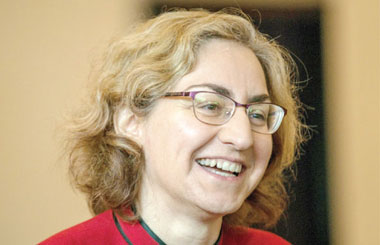Online, but off the mark
Updated: 2016-02-18 08:30
By Shan Juan and Cao Yin(China Daily)
|
|||||||||||
With more people using the Internet as a source of information about medical problems and treatment, experts are warning that inaccurate content could pose a risk to anxious patients, as Shan Juan and Cao Yin report.
As more Chinese turn to the Internet in search of information related to health issues and medical care, concern is growing that people may receive incorrect or contradictory advice because of a lack of regulation related to online health information.
With 688 million netizens last year, China has the world's largest number of Internet users. A survey conducted by the health education center of the National Health and Family Planning Commission showed that the Web has become a major channel for people seeking health-related information.

|
A webpage of the hemophilia forum on Baidu Tieba, an online community-based platform operated by Baidu, a leading Chinese Internet search engine. Guan Xin / China Daily |
Around 30 percent of those polled said they habitually searched the Internet for "self-diagnosis tips" before consulting a medical practitioner.
"Health content is easily available and abundant in cyberspace, but much of it is unprofessional and incorrect," Mao Qun'an, a commission spokesman, said.
That message was brought home recently when Baidu, one of China's most-popular online search engines, found itself at the center of a controversy related to medical information.
Investigation urged
Last month, 36 healthcare NGOs asked the Beijing authorities to conduct an investigation into Baidu over what they claimed were "inappropriate marketing practices".
The NGOs lodged a joint complaint with the Beijing Administration of Industry and Commerce, accusing the Nasdaq-listed online giant of violating the Advertisement Law by allowing misleading medical ads to be listed on its forums. They also repeated their calls for an investigation.
Moreover, some users of Baidu Tieba, an online community-based group discussion platform, have accused the company of selling details from its hemophilia forum to unregulated private hospitals, making it easier for them to reach potential clients.
One user called "Mayicai" said about 5,000 netizens use the Tieba online community to discuss and share effective treatments for hemophilia, and selling the online community to the hospitals could endanger patients' health.
In response, Baidu issued a statement in which it promised to cease the commercialization of forums that focus on the diagnosis and treatment of illnesses and could influence patients' recovery and well-being. Baidu also invited NGOs to run the forums.
Baidu Tieba, established in 2003, hosts more than 19 million online communities, of which 2,000 are commercial ventures, according to Lu Fubin, the head of Baidu Tieba.
"Of more than 10,000 online forums on medical issues, around 60 have been commercialized," Lu told Caijing, a financial magazine.
Yiyou Gongyi, one of the NGOs, claimed on its micro blog that Tieba's "inappropriate move" was just "the tip of the iceberg" of allegedly false online advertising.
It said Baidu's dominant position in China's online search market means the company can easily help enterprises with marketing campaigns, and ads for healthcare are one of the powerhouses of its search-engine business.
An industry report by JPMorgan Chase & Co, published in January, showed that advertising related to medical services accounted for 15 to 25 percent of Baidu's revenue of 49 billion yuan ($7.5 billion) in 2014. The lion's share of the revenue was generated by paid listing services that are widely used on online search engines.
Many private hospitals have long relied on paid listings to attract patients, according to a report in Beijing News in January.
In addition to Baidu, hospitals use a number of popular search engines, such as Sogou and Qihoo 360, the report said, adding that one large private hospital spends an average 80 mill-ion yuan on promotion annually, with paid listings accounting for a large part of the outlay.
Mao, of the National Health and Family Planning Commission, said the authorities are deeply concerned about the issue because of the large number of patients whose medical details are shared online.
"We will contact Baidu to arrange discussions to prevent such problems," he said.
Unregulated content
According to Mao, the commission, China's top health authority, used to encourage disease-specific NGOs to actively cooperate with Baidu to correct misunderstandings and remove inappropriate information about a range of illnesses on Tieba forums.

The collaborations were one-time ventures, but Mao has urged regular consultations between NGOs and information providers. He said Baidu is an excellent tool and could still serve as an online platform for health and disease information, providing the content is checked before being posted.
Physicians have also expressed concerns about largely unregulated online health content.
"It seriously affects our clinical work," said Zhang Zhichao, a leading specialist in andrology (diseases specific to men) at Peking University First Hospital.
"Some patients have even asked me to perform certain tests they learned about on the Internet," he said.
A midwife at a well-known public hospital in Beijing said patients have used information garnered online to challenge diagnoses and medical interventions.
"However, most of the time they only got part of the truth (from the Internet)," said the midwife, who preferred not to be named because of the sensitive nature of her work.
She recalled one pregnant woman who suspected she had prostate cancer because she had noticed small amounts of blood in her urine.
"She learned about that on Baidu - unfortunately the information ignored the fact that woman don't have prostate glands," she said, adding that medical professionals are now spending an increasing amount of time dealing with the impact of inaccurate information online.
Poor health awareness
Surveys conducted by the National Health and Family Planning Commission show that many people have low awareness of illness and health issues. According to Song Jun, deputy director of the commission's Health Education Center, the latest survey, undertaken in 2014, found that more than 90 percent of Chinese lack awareness of health-related issues, and are unable to distinguish accurate information from falsehood.

Moreover, the supply of quality medical resources is unable to meet the ever-rising demand of an ageing society such as China, he said.
Statistics published by the commission show that the number of medical institutions rose by 1.5 percent every year from 2004 to 2013, while hospital attendance figures registered a 7 percent annual increase over the same period.
Liu Yuewu, a leading thyroid cancer specialist at Peking Union Medical College Hospital, said he sees more than 50 patients on average every day, many of them from outside of Beijing. "Even with that work rate, I still can't meet the demand," he said.
According to Liu, the hospital performs more than 1,100 thyroid surgeries on average every year, a huge jump from 1986, when there were just 10 cases.
The shortfall between supply and demand was illustrated by the case of a 40-something woman surnamed Su, who said she spent two weeks living in a cheap hotel room measuring just 8 square meters while she waited for a hospital bed.
In late January, Su travelled from her hometown in the northeastern province of Liaoning to consult Liu, who diagnosed thyroid cancer. "I missed the Spring Festival family reunion back home because I had to stay here waiting for a bed to have surgery," she said.
In addition to the growing demand, underperforming hospitals and medical professionals are placing even greater strain on the limited resources and threatening the quality of service.
"Every month we receive patients whose previous surgeries have failed," Liu said.
Song said limited access to quality medical resources is one of the reasons people have become so reliant on online medical advice forums, but he stressed that the Internet can still play a useful role in health education and information exchange.
"It's effective and convenient as a health communication tool, but the content needs to be strictly regulated," he said.
Search for solutions
In China, Internet security and the supervision of online content come under the jurisdiction of the Cyberspace Administration, the country's top Internet watchdog. The administration has issued a public statement criticizing Baidu's forum management and supervision, and it has ordered the company to correct misinformation and provide clear explanations of issues.
"Baidu Tieba is disordered and has made illegal commercial moves. Some information on the forums is not objective, and some also contained illegal content, including terrorism and violence," the statement said.
The authority said members of the public had also complained about illegal information posted on Baidu Tieba. "Some forums had fake advertisements, images of violence and content that broke privacy conventions," according to an official, who declined to give his name or the exact number of complaints related to medical care.
"Such improper content has seriously damaged the online environment and its users," he said, adding that the administration has ordered Baidu to strengthen its regulatory and supervisory systems to improve information security.
Li Yuxiao, head of the Internet Management Law Research Center at Beijing University of Posts and Telecommunication, said Web operators must pay more attention to online communities related to public-interest issues "because the topics on the forums will influence people's health and daily lives".
"We have a nationwide rule that requires the government to review operators of websites related to medical information, news, education, and health and food safety. However, there is a still a lack of regulation covering the content of online communities of this type," he said.
"As Web operators, they have an obligation to increase supervision of content that concerns people's livelihoods. Although sometimes it's hard to review every piece of content, it is essential that we clarify the operators' responsibilities."
Zuo Xiaodong, vice-president of the China Information Security Research Institute, said it is not suitable for website operators to benefit from such online public communities.
"Public interest should be their main priority. It won't prevent them from continuing to make huge profits," Zuo said. "Web operators cannot ignore improper information on their platforms. They have to make the right decision when balancing profit and public interest."
Meng Jing contributed to this story.
Contact the writers at shanjuan@chinadaily.com.cn
(China Daily 02/18/2016 page6)
Today's Top News
Huawei bids to become 'Internet of Things' platform
Britain's Cameron defends EU deal
Sichuan opera proves a hit with UK audiences
WeChat to charge fees for digital wallet transfers
Stocks fall in China after holiday week
Putin, Obama discuss Syrian crisis over phone
Global stock swings not caused by China factors
Russian PM warns against 'new cold war' at MSC
Hot Topics
Lunar probe , China growth forecasts, Emission rules get tougher, China seen through 'colored lens', International board,
Editor's Picks

|

|

|

|

|

|







